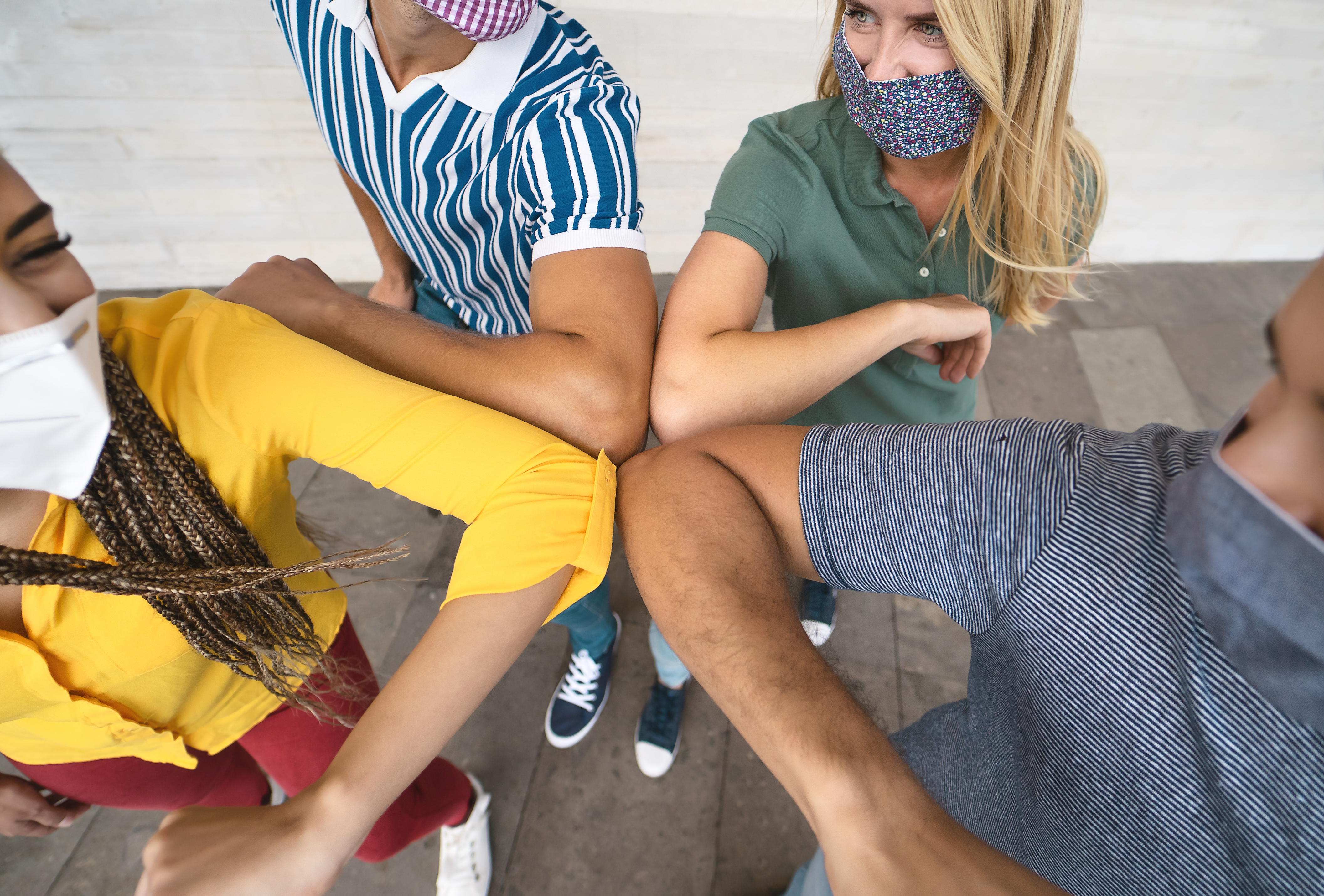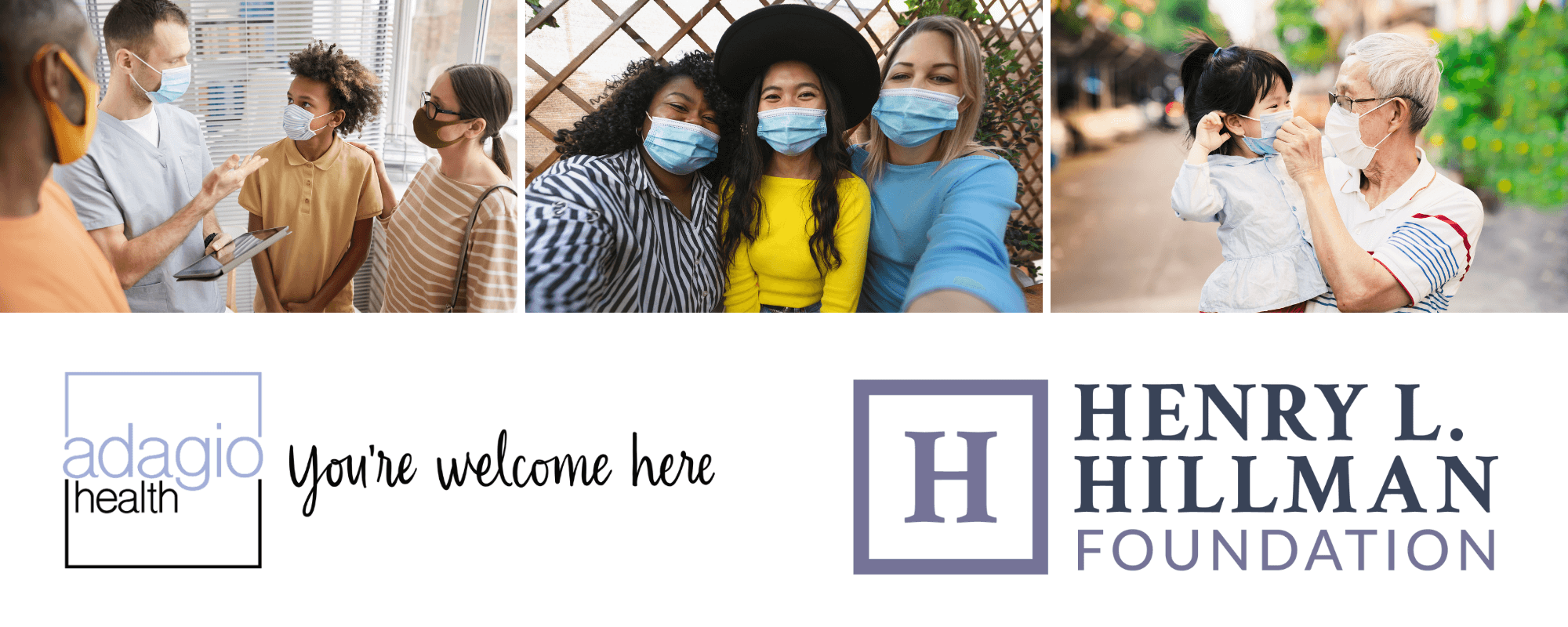Call 1-800-215-7494 or click here to find the Adagio Health Medical Office nearest you.

Navigating all of the information around COVID-19 can be overwhelming. Thanks to a grant from the Henry L. Hillman Foundation, Adagio Health is working to make it a little easier for the communities we serve. Here’s what you need to know:
- All Pennsylvanians age 12 and over are eligible to receive a COVID-19 vaccine.
- Many providers, including Adagio Health, are now accepting walk-ins for COVID-19 vaccines.
- UPMC now offers a Vaccine Language Line for patients that includes Spanish, Nepali, Arabic, Vietnamese, Mandarin, Russian, and more.To contact the Vaccine Language line, call 833-660-2416.
- If your COVID-19 vaccine requires two doses, be sure to return to your vaccine provider to receive your second dose at the right time!
According to the Center for Disease Control & Prevention (CDC), COVID-19 vaccines are safe and effective. COVID-19 vaccination is recommended for all people aged 12 years and older, including people who are pregnant, breastfeeding, trying to get pregnant now, or might become pregnant in the future. Pregnant and recently pregnant people are more likely to get severely ill with COVID-19 compared with non-pregnant people. Getting a COVID-19 vaccine can protect you from severe illness from COVID-19:
- Millions of people in the United States have received COVID-19 vaccines under the most intense safety monitoring in U.S. history.
- After careful review, the American College of Obstetricians and Gynecologists (ACOG) has stated that COVID-19 vaccines do not impact fertility.
- The CDC recommends you get a COVID-19 vaccine as soon as you are eligible.
- Getting the vaccine will help keep you and your loved ones safe.
- The CDC, FDA, and other federal partners will continue to monitor the safety of COVID-19 vaccines as they continue to become more broadly used in the population.
- Results from monitoring efforts are reassuring. Some people have no side effects. Many people have reported mild side effects after COVID-19 vaccination. These reactions are common and typically short-lived.
Find more information about COVID-19 vaccines on the
PA Department of Health’s website.
There are three different COVID-19 vaccines available right now in the US.
Please remember that the best vaccine for you is the one that is available to you! For more information,
click here.
Additionally, the CDC is now recommending that people who are moderately to severely immunocompromised receive an additional dose of an mRNA COVID-19 Vaccine (Pfizer-BioNTech or Moderna) at least 28 days after completion of the initial mRNA COVID-19 vaccine series. With emerging evidence showing some people who are immunocompromised experienced a reduced immune response to the initial COVID-19 vaccine series, this update aims to prevent serious and possibly life-threatening COVID-19 within this population.
The additional vaccine should be considered for people with moderate to severe immune compromise due to a medical condition, or receipt of immunosuppressive medications or treatments. This includes people who have:
- Active treatment for solid tumor and hematologic malignancies
- Receipt of a solid-organ transplant and taking immunosuppressive therapy
- Receipt of CAR-T-cell or hematopoietic stem cell transplant (within 2 years of transplantation or taking immunosuppression therapy)
- Moderate or severe primary immunodeficiency (such as DiGeorge syndrome, Wiskott-Aldrich syndrome)
- Advanced or untreated HIV infection
- Active treatment with high-dose corticosteroids (≥20mg prednisone or equivalent per day), alkylating agents, antimetabolites, transplant-related immunosuppressive drugs, cancer chemotherapeutic agents classified as severely immunosuppressive, tumor-necrosis (TNF) blockers, and other biologic agents that are immunosuppressive or immunomodulatory.
COVID-19 remains extremely contagious. It is important to continue wearing masks in public IF YOU HAVE NOT BEEN VACCINATED. The CDC will continue to issue guidance around safety over the next several months. If you think you might have COVID-19, you can find more information about getting tested for the virus here:

Need help right away?
Contact PA’s Crisis Text line by texting “PA” to 741741.
BigBurgh.com – A free site maintained by the City of Pittsburgh where users can find resources, hotlines, live help, and more.
Aunt Bertha – Search for free or reduced cost services like medical care, food, job training, and more.
Food Assistance
Adagio Health WIC – Women, Infants, and Children
Greater Pittsburgh Community Food Bank
Feeding Pennsylvania Food Bank Locator
Just Harvest
Pittsburgh, PA Food Pantry List
Housing Assistance
Allegheny County Housing Services
PA Emergency Rental Assistance Program
PA Housing Search
Fair Housing Partnership
Action Housing Inc.
Housing Authority City of Pittsburgh
Income Assistance
PA COMPASS – Various health and human service benefits
Benefit Finder
PA Cash Assistance
Find Your County Assistance Office
Low-Income Energy Assistance Program
Medical Assistance
Adagio Health Locations – Reproductive care, birth control, preventative health services, cancer screening, and more at no cost to you!
PA COMPASS – Various health and human service benefits
CHIP (Children's Health Insurance Program) – For kids and teens
Pennie Health Coverage Marketplace
Mental Health Resources
Suicide Prevention Lifeline: 800-273-8255
Substance Use Helpline:
1-800-662-4357
Veterans Crisis Line:
1-800-273-8255 and press 1, or text 838255
Behavioral Health Treatment Services Locator
Mental Health During the COVID-19 Pandemic
Resolve Crisis Services (Allegheny County):
1-888-796-8226
Stress & Coping
Pregnancy, Breastfeeding, Newborns, and COVID-19 Resources
Breastfeeding and Caring for Newborns
Pregnant People and Increased Risk for COVID-19
Pregnancy and COVID-19
Translated Resources (languages other than English)
CDC Resources: 64 Language Options
Centers for Medicare & Medicaid Services: 23 Language Options
UPMC Vaccine Scheduling Language Line
Additional COVID-19 Resources
Your Guide to Masks
When You’ve Been Fully Vaccinated
People at Increased Risk – Includes
people who use drugs or have Substance Use Disorder,
racial and ethnic minority groups,
people experiencing homelessness,
people living with disabilities, and more.
Travel During the COVID-19 Pandemic

COVID-19 is an infectious disease caused by a newly discovered coronavirus.
Most people infected with the COVID-19 virus will experience mild to moderate respiratory illness and recover without requiring special treatment. Older people and those with underlying medical problems are more likely to develop serious illness, potentially leading to hospitalization or even death.
People with COVID-19 have had a wide range of symptoms reported – ranging from mild symptoms to severe illness. Symptoms may appear 2-14 days after exposure to the virus. People with these symptoms may have COVID-19: Fever or chills, cough, shortness of breath or difficulty breathing, fatigue, muscle or body aches, headache, new loss of taste or smell, sore throat, congestion or runny nose, nausea or vomiting, diarrhea.
Seek emergency care immediately if you experience worsening symptoms and warning signs such as: trouble breathing, persistent pain or pressure in the chest, new confusion or disorientation, inability to wake or stay awake, and pale, gray, or blue-colored skin, lips, or nail beds, depending on skin tone.
If you are experiencing these symptoms, or if you have been exposed to COVID-19, it is important that you stay home and isolate yourself from others in order to avoid spreading the virus. Even if you don’t feel sick, you can still be very contagious and spread the virus to others. You can also get a COVID-19 test to verify if you are currently infected with the virus – see the below resources section about testing for more information.
You can help slow the spread of COVID-19! Take these important steps to do your part to control the virus:
- Wear a mask – Any time you leave your house, be sure to wear a mask that covers both your nose and your mouth.
- Maintain social distance – stay at least 6 feet apart from anyone outside of your household, even when masked or outdoors.
- Wash your hands often and properly – with soap at warm water for at lest 20 seconds. If soap and water are unavailable, use a hand sanitizer with at least 60% alcohol.
- Get a COVID-19 vaccine if and when you are able to!
According to the
CDC, “long-standing systemic health and social inequities have put many people from racial and ethnic minority groups at increased risk of getting sick and dying from COVID-19.” Factors such as discrimination, income inequality, disproportionate occupations in essential work, and access to healthcare ultimately lead to increased risk of illness, including COVID-19. These barriers must be addressed in order to allow every individual a fair opportunity to be as healthy as possible!
Though we are far from achieving health equity, there are things we can do and resources that we can utilize in order to protect ourselves and support one another, leading to improvements in our communities.
 All information on this page has been gathered from reputable, factual sources including: The Centers for Disease Control and Prevention (CDC), World Health Organization (WHO), and The PA Department of Health (PA DOH).
All information on this page has been gathered from reputable, factual sources including: The Centers for Disease Control and Prevention (CDC), World Health Organization (WHO), and The PA Department of Health (PA DOH).